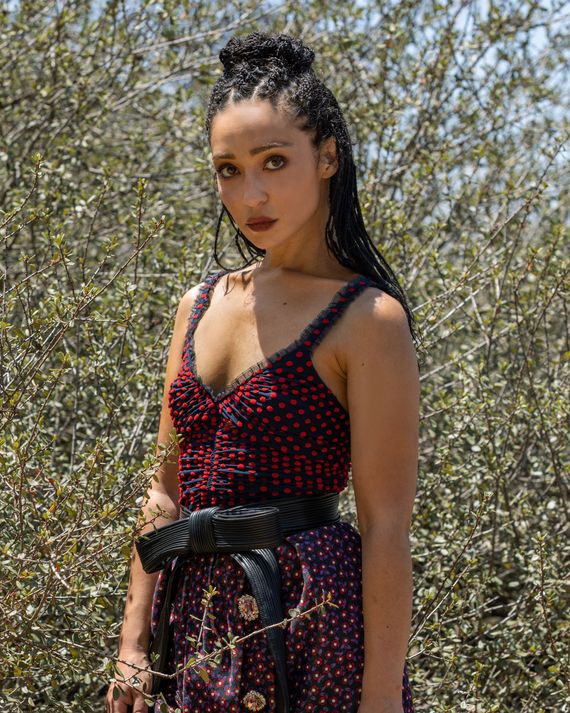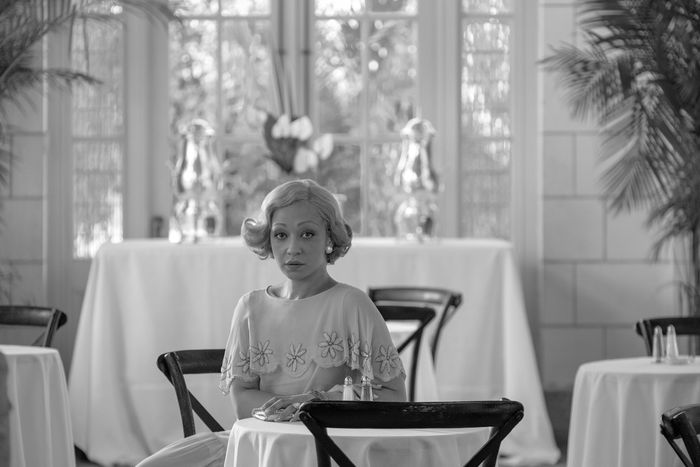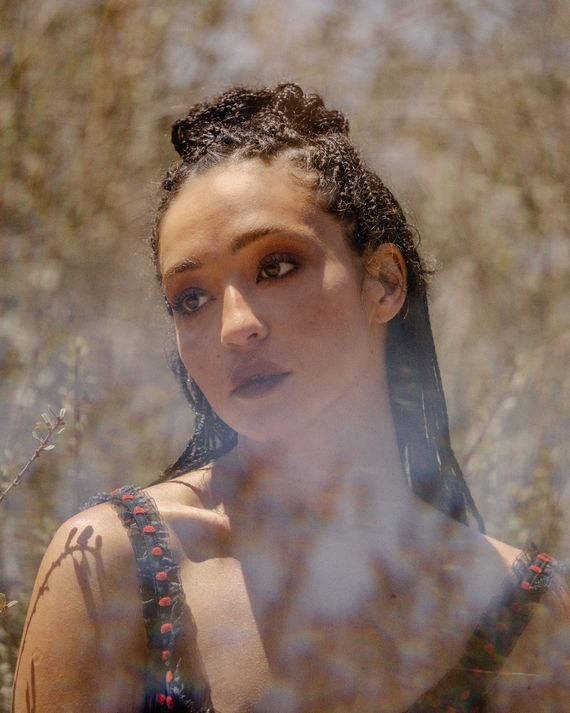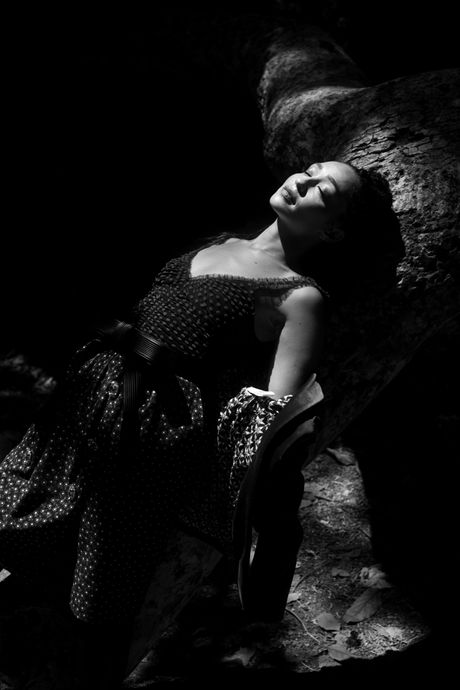
It’s a bright day in Los Angeles, and I’m sitting in a plush hotel lobby talking to the actress Ruth Negga about what it feels like to desire something you can’t have. At 40, she slots herself within a group of Black actresses who have perhaps had to “fight harder, wait longer, be more available” in order to clear a path for multi-dimensional roles. She feels she has sacrificed, missed weddings and funerals, put her personal life on hold. Then again, she counters, she still believes there’s “something exquisite” about longing — about not getting what you might think you want. She’s got an amused, faraway look in her eyes now, as if she has remembered an ancient joke about the nature of existence. “We do forget that, don’t we?” she says. “After a certain amount of money … you might become unfulfilled. Then you find yourself building penis-shaped rockets. And everyone, we’re looking at them going, So you’ve destroyed the earth and you’re having a big swinging mickey flash up in the fucking atmosphere. Great. Good for you. ”
Negga is a star you’d likely recognize as such by aura, if not by name. Her face, all eyes and angles, could command a silent film; in her selection of parts, she can seem to be a single-minded dramatic artist. Her turn in the 2016 biopic Loving as Mildred Loving — the Black American woman who became a somewhat accidental pioneer in the legal protection of interracial marriage — earned Negga, a relative newcomer to Hollywood, an Oscar nomination. Last year, she played Hamlet in a buzzy production staged at St. Ann’s Warehouse in Brooklyn — an “emo dreamboat,” as one headline put it. Her latest project is Passing, an elegant, chilling film based on Nella Larsen’s 1929 novel of the same name, in which Negga plays a woman who has chosen to pass as white. Yet there’s mischief and inquisitiveness, a hint of screwball timing, evident in all her performances. “Every day when she was on set and would come into the makeup trailer,” her Passing co-star Tessa Thompson tells me, “something energetically would change — just because she would come in and, like, say something incredibly funny.”
When we meet, Negga says she is in the middle of watching a spate of decidedly light fare. She mentions the Irish comic Dylan Moran and his TV series Black Books: “It’s like if Beckett was writing a sitcom.” She’s watching Mindy Kaling’s teen rom-com series, Never Have I Ever, and the new Fear Street. The sight of brown and Black people performing goofiness, rebellion, and ordinariness, rather than the old types — the figures killed off first, the credits to their races — well, it conveys a sort of freedom, she says. She would love to do comedy someday. “But I’ve got such a tragic face,” she says. “I do all the tragedies.”
Passing, directed by Rebecca Hall in a close rendering of the Harlem Renaissance novel, follows the story of Irene Redfield (Thompson), the well-settled wife of a Harlem physician who one day runs into Clare Kendry, an old acquaintance from Chicago, only to find her in a new incarnation as the wife of a white man who has no idea she’s Black and who cheerfully holds forth on his ripe hatred of Black people. Irene is dismayed that Clare is passing, but Clare, with her bleached hair and eyebrows, her disdain for moral uprightness, and her self-centered lust for life, also embodies an agency that Irene envies. Clare is, in a sense, the ultimate cool girl. Reckless and hard to read, she has a gleam in her eye that suggests she is about to carry out a scheme, no matter the consequences. The reason? It’ll be fun, for her — useful, for her. The relationship that forms between the two seemingly antithetical women covers vast psychological terrain, from admiration to envy, love to revulsion, mapped in every twitch of the head and microtone.
Larsen wrote the novel from her position as a fixture of Harlem society, the then-wife of a prominent Black scientist. She opened a view not easily shown by men: quiet moments of dialogue passed at parties, the ins and outs of the class-based jockeying that fueled such organizations as the Negro Welfare League, of which Irene is a key organizer. Both Larsen’s novel and Hall’s film honor the beauty of the era, its subversive gestures of play and glamour, its infusion of jazz, its flashes of jewelry, while revealing its ambiguities — the colorism and classism reflected in stilted acknowledgment of the poorer, darker-skinned household help in the Redfield home and the weight of Irene’s emotional repression, her sacrifices toward Black upper-middle-class life.
Clare’s ruse recalls classic American hustles. She is a platinum-blonde Gatsby with scarier stakes who assesses the lay of the land, sees a corrupt system, and adjusts accordingly, thereby acting as a mirror to society. Hardly a fool, she nonetheless fulfills the function of the archetypal clown. “Look at the jester in Shakespeare. He’s the one who speaks the truth, and he’s allowed to get away with it,” Negga points out. Getting into that character’s mind-set posed a series of tantalizingly maddening riddles. “Is she the cat that got the cream? Is that what she really wants?” she asks. “Because in many ways, if she does just want superficial things, I think she’s probably more threatening. She doesn’t want access to the white world to save the world. She just wants it because she wants it. Imagine a Black woman just wanting something because they want something and that’s it.”
Negga seems hardwired to understand ambiguity: “My very existence for some people is super-antagonistic, and I was like, Well, just lean into that, Ruth.” She is half Ethiopian, half Irish, born in Addis Ababa and shuttled by her Irish mother to Limerick; her father died when she was young. She was schooled primarily in London, living at first with her mum in a working-class area, only to move with laserlike intensity through blue-chip theater and into film. Her selfhood, she says, often seems to confuse those who demand knowability from a person. Growing up, she felt judgment thrown her way not only for her Ethiopian otherness but for her Irishness. She met antagonism with antagonism. “I was a bit of a goth,” she says. (On the day we meet, she wears braids, a black corset, a long black skirt, and combat boots — the poised adult version, perhaps, of that searching teen identity.) Still, there was unbelonging in whatever form she took: “To be a Black goth was like … you weren’t allowed. Why aren’t you interested in rap music? Which I was. But it’s like you have to fulfill a certain type of stereotyped expectation, and I thought, God … fuck off. Fuck that shit. Fuck no. No.”
Negga came across the novel Passing around then, as an adolescent. (She would return to Ireland to study acting at Dublin’s famed Trinity College, where she began her career on the stage.) Stephen Lawrence, a Black teenager, had been stabbed and killed near her school in London, a murder that set off a reassessment of policing and racism in the U.K. Around the same time, Negga fell into Black American literature: Toni Morrison, James Baldwin’s Giovanni’s Room, the writings of Audre Lorde, Malcolm X. In the course of her self-education, she was introduced to the concept of passing. She was drawn in by the taboo of the act — the way it was recorded as a sort of postscript, dealt with most deftly by women authors. Then there was the sheer ordinariness of the compulsion. After all, didn’t Negga shift her accent when in the company of posher Brits? Didn’t everyone hide themselves in some way? But the idea of Black people passing as white added a new and painful dimension to the human urge for belonging and self-determination, set against the barbaric violence of racism.
The actress is no longer a teen given license to try on identities. She feels less sure of herself in some ways now — except when she’s on the stage or screen. “It’s the one place I don’t feel like an impostor,” she says. Bette Davis is a hero of hers; those large eyes and Davis’s hold on the sardonic seem reincarnated in some ways in Negga, especially in her portrayal of Clare. Critics have often commented on Negga’s command of physical presence. She loves words, she says, but the body’s ability to express meaning can feel infinite in scope. “I’d sooner see a dance production than a play,” she explains. “There’s something really elemental about it. I’m interested in what happens when we bypass the intellectualization of art.”
When Hall first approached Negga for the film, it was for the part of Irene. Negga had come off a series of contained, “stoical” roles, as Hall told me. Negga jumped at the project, but after reading the script, she realized she badly wanted to play Clare. In the role, she looks up and through her lashes, almost cartoonishly built to provoke. She can seem empowered by gestures that might, in another context, suggest diminishment, an insecure rather than a confident grip on her own power. She “does these eye flicks to see how she’s shocking Irene,” Negga says, as if describing someone separate from her. “People who love living, they like a reaction. Passing is a tragedy. But she refuses to make herself tragic. She resists the trope of the tragic mulatto. She thinks tragedy is for losers.”
Clare can make the other characters uncomfortable, owning her dangerous choice to pass with the ease of a person who truly doesn’t care what others think — while Irene cares too much. The inversion draws the women to each other. Pangs of unrequited love shimmer through the film, told in glances, in seemingly small negotiations, as well as in a final scene that plays out like a shared dream.
Negga identifies in Passing a tension she has noticed in the work of other Black American thinkers: twin senses of “deep belonging” and “deep otherness,” evident, for example, in Morrison’s writing. Living in America only heightens her awareness of the struggle between the desire to be accepted and the need to revolt. She’s surprised to find herself feeling at home in a place where she sees the Hollywood sign whenever she walks out of her apartment. “I hate to broad-strokes the fuckin’ whole country, but I just love the idea that people see something and go, Yeah, I feel I can do it. I can do that,” she says. “It’s this idea — hugely mistaken — that we are all on the same playing field.”




